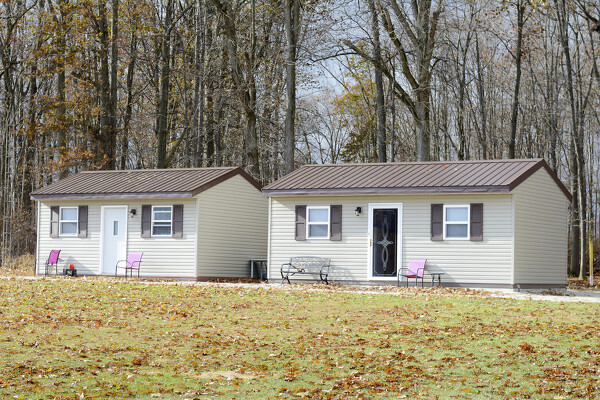Saturday, May 10th, 2025
Addressing the complexities of homelessness
Auglaize official shares insights with Mercer Reentry Coalition
By Abigail Miller

File Photo/The Daily Standard
Hand-Up Village at Abounding Grace Ministries in Celina is a faith-based ministry that helps families experiencing homelessness find temporary housing, like these cabins.
CELINA - An Auglaize County official who's leading the charge in assisting the county's homeless population shared some of his experiences with the Mercer County Reentry Coalition at their May meeting on Friday afternoon at Grand Lake United Methodist Church in Celina.
Auglaize County Emergency Management Agency Director Troy Anderson said prior to starting the county's Community Emergency Response Team (CERT) and the Candle of Hope program for homeless citizens, he and his team of emergency response workers were relying heavily on the American Red Cross.
"But then there was a delay in getting services, or while we received the money that was coming in to help the victims, it wasn't 100% of what was donated," Anderson said.
Beginning with CERT
From there, he and his team of 25 volunteers in 2018 set up the Auglaize County CERT, which falls under the EMA office.
The group is dispatched by county law enforcement out to emergency scenes to help during a time of need, Anderson said. For example, the group will help to source clothing and furniture donations for house fire victims and even put them up in an area hotel for a period of time.
"In doing that, we were also running into homeless individuals, or law enforcement would say, 'Oh this would sure be a nice program to have to help (the) homeless because we're seeing a big need.' We never saw that. I mean, homelessness was like a moot subject. You talked to an elected official, (and they'd say) there was never a homeless (population)."
That then led to CERT starting the Candle of Hope program, which began with assisting the homeless population in Auglaize County, Anderson said. Recently, the group has expanded the program to assisting other counties.
Anderson said he's learned that there are two classifications of homeless people.
"There was the true homeless that needed help," he said. "There was the homeless who spent more time making money off of agencies like you have right here, because there was no coalition to put together." He said that class of homeless people will go around to multiple local churches asking for help.
"The churches were taking their donation funds and giving them to them to supply the need," he said. "So by the time we got to looking and tracking a couple of homeless individuals in Auglaize County, (we found that) they were generating several thousands of dollars a week."
Auglaize homeless coalition forms
To avoid that issue, Anderson started an Auglaize County homeless coalition in 2020 in order to work with those local churches and agencies to keep track of what people they are helping.
"We brought in a bunch of agencies - actually, we had 20 agencies come in and sit down and we started writing on the board what we were seeing, what were the main issues we had as far as what can we provide or what our expectation of homelessness was," Anderson said. "When it came down to it, everybody just started looking around, (and said), 'Wow, we're getting a lot of money that's taxed to all of us, but we could pool our money together and form this coalition to do a better service.'"
Along with that, this coalition of agencies educated itself on the four known types of homelessness, which include transitional, episodic, hidden and chronic.
Hidden homelessness refers to people who have lost their permanent residence but have support from family or friends to sleep on couches or in a temporary room. Transitional homeless people have lost their housing due to a major life change or event. Episodic homelessness refers to those who have cycles of instability, often caused by substance abuse or mental health issues. Chronically homeless people have been without a permanent residence for over a year or have had frequent instances of homelessness within the last couple of years.
The group compiled the information in a Google database, Anderson said, and started establishing policies and procedures to prevent people from taking advantage of their services.
The Auglaize coalition now uses a basic referral form for everyone who comes to them requesting help. Once that form is filled out at the EMA office, it is sent out to all of the community partners in the coalition so everyone is on the same page with who has been receiving help.
How they help
Some of the help that the coalition has been able to provide, funded 100% with donations or by fundraising, includes buying people Greyhound bus tickets or paying for their taxi bills, putting people up in a hotel for a few days, and providing a regularly updated list of employers in the area that are hiring.
Ahead of putting someone in a hotel, the group will inform the person of the amount of days they will be able to stay - usually, Anderson said, it's three to five days.
"Or whatever (period of time) we work it out to be, we'll spell it out," he said. "(Then we tell people), 'You need to come over to us or make contact with us daily.' If we see that they're continuing to work towards something, and maybe it might be a hold up waiting on a drug test or something coming back to get employment or because of a holiday weekend, or whatever, we'll extend it. But again, if they don't meet any of those upfront, we tell them, 'You don't meet our requirements.' And the only other choice is going to be, after that time's up, they're either going to go to Findlay, Sidney, Lima or Van Wert based on whatever shelter's there … or Montgomery County."
In addition, Anderson said that the coalition partners with the county VA to better serve homeless veterans.
"Veterans coming in are a priority," he said. "As soon as we get a hit about a veteran saying they need help or assistance, we move them forward in the process because there's a separate fund from the VA that comes to us. We don't spend VA money on anybody else, only for the veterans."
A growing problem
Anderson reported that the coalition helped 265 people in 2024, and so far this year, they've helped 100 people.
"So does that tell you anything where the numbers are going right now? We're climbing," Anderson said. "In 2018, I only had six (people) and it just keeps going. These are not all 100% drug and alcohol (related). In our database, our age range is from 17 to 82. Most of our individuals that we're seeing right now, that we're helping, are 60 to 82 in years."
He said his coalition repeatedly takes the issue to their elected officials, "and it goes nowhere."
Per a report from the Coalition on Homelessness and Housing in Ohio, the primary cause of homelessness is the lack of affordable housing.
"A decade ago, Ohio started making significant reductions in homelessness thanks to increased federal funding and effective housing first policies," the report states. "In recent years however, rampant rent inflation combined with the end of pandemic assistance have reversed progress, and Ohio's homeless population is rising again."
Anderson said he knows of apartment complexes in Auglaize County that "all they did was change the paint on the walls and raise the rates," in some cases raising the rent by nearly 100%.
He added that the coalition has tried to establish a homeless shelter in the county. Unfortunately, as soon as the public finds out about such an initiative, it gets shut down because no one wants to live beside a homeless shelter.
"We've tried getting a shelter in Auglaize County, but it's been cut," Anderson said. "They went in and redid zoning so we can't put a shelter in Auglaize County."
However, Anderson said he is working on a loophole.
"Trailer courts always have maybe a pad where a trailer used to be; it already has electric, utilities, stuff like that," he said. "So we're looking at utilizing and working with the trailer park managers to maybe put some tiny homes up on them. As long as it's a 10-foot by 10-foot structure, then my auditor's office is not going to charge taxes on it. It's not a sure thing, but we can at least get two or three tiny homes out there. That's what we're working on. But to actually have a shelter in Auglaize County - I'm going to sit here and say it's probably 95% impossible."


